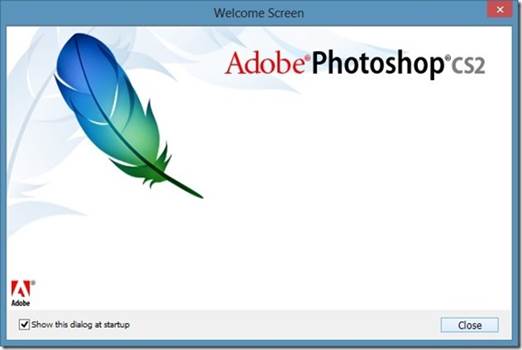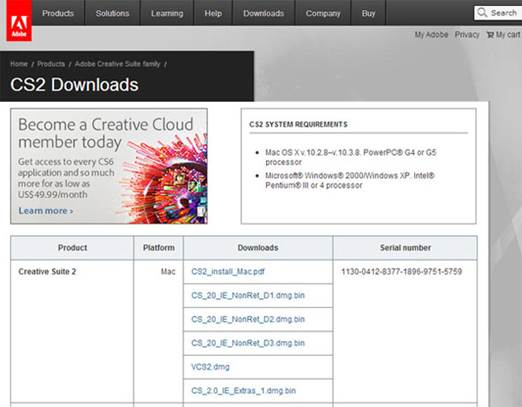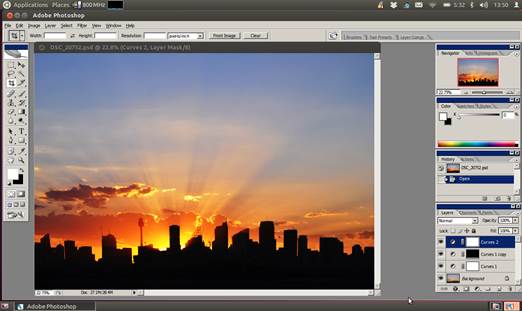CS2 may be past its prime, but a free
legal copy would be very tempting
Everyone likes getting something for
nothing. Whether it’s finding a quid on the floor of the train or bagging an
unexpected free upgrade on a flight, acquiring what would normally cost you
money without having to pay for it feels good.
It feels so good, in fact, that once people
have become used to getting things for free, it’s hard to make them stop – a
sort of commercial inertia that shows itself in software piracy, stolen
photography and pinched movies. For example, I was once watching a film in a
Mongolian hotel when a warning flashing up on been provided for award
consideration only and wasn’t for public distribution.

CS2
may be past its prime, but a free legal copy would be very tempting
Most recently, Adobe made headlines for
going free. All of a sudden, a set of links to download Creative Suite version
2, plus serial codes to make it work, showed up on its website, and the crowd
went wild. The internet was suddenly awash with stories lauding Adobe’s
generosity of spirit, and the page hosting both the download links and the
serial numbers collapsed under the weight of the sudden traffic it was
receiving. Proof, were it needed, of the captivating concept of free, legal
copies of Photoshop – even when the software in question was going on eight
years old.
Today, typing in ‘Adobe CS2’ into the
Google search box produces the autosuggestions ‘download’, ‘keygen’ and
‘crack’. It’s not a scientific test but it does suggest both the longevity of
earlier version of Photoshop and a continuing appetite for older versions.
As with as much in life, the story seemed
too good to be true, and so it proved. Adobe, it turned out, had merely got
round to shutting down the activation servers that user of CS2 needed to
install their software. So, in the name of not leaving upgrade Refuseniks out
in the cold, it had simply published links to the software installers online,
plus the serial codes needed to activate them, so that existing users could
bypass the defunct process.
The internet news cycle is an impatient
one, and so it was that the ‘Free CS2 for everyone!’ stories cropped up before
Adobe had a chance to rebut them. Journalists who prioritized fact-checking
over speed were eventually pointed to an Adobe statement explaining precisely
what the deal was namely that the software still wasn’t legal to download and
use unless you’d paid for it. ‘While this might be interpreted as Adobe giving
away software for free, we did it to help our customers’, said a company
statement.
Weirdly, though, the pages containing both
the links to download CS2 and the serial codes needed to activate them were
still live as MacUser went to press. You can find them with a Google search and
a few clicks. This is odd behavior from Adobe, which at the same time appeared
to be both discouraging and encouraging the downloading of CS2 for free.

Free
lunch: An official Adobe site offering CS2, for free, with the serial number
included. But that doesn’t mean CS2 is free. Confused yet?
Make no mistake, if Adobe really had been
giving away CS2, it would have been a double-edged sword. For one thing, CS2 is
eight years old and so, is missing all sorts of bells and whistles that users
of newer versions of the software enjoy. For another, Creative Suite 2 is a
Rosetta application – that is, it doesn’t run natively on Intel Macs, which is
every computer Apple has produced since 2006. Instead, on Intel Macs it uses
the Rosetta code translation technology, which isn’t installed by default in OS
X Snow Leopard, doesn’t come with Lion or Mountain Lion, and can’t be installed
on them from anywhere.
Still, what if adobe had actually made CS2
available, for free, to anyone? The near-instant death of the site holding the
forbidden fruit hints at enormous, pent-up demand for legal version of
Photoshop. At the end of 2012, Adobe piracy chief (one wonders what the uniform
must be for that job) Richard Atkinson said the company notched up a frankly
amazing 55 million illegal Photoshop activations over the past year. It could
be quite possible – indeed, this story makes it seem downright likely – that
users of illegal copies of Photoshop would be willing to swap up-to-the-minute
features for the warm and fuzzy feeling of using licensed, legal software.
The question, of course, is what would be
in it for Adobe? It wouldn’t gain – not immediately, at least – any more paying
users. Indeed, its costs would go up, thanks to the extra cost of hosting a
popular site that allows users to download gigabytes-worth of software for
free. It might stand to gain a few users from free applications such as the
(presently nearly unusable thanks to its awful interface) GIMP, but it seems
unlikely that Adobe itself would stand would stand to gain too much.

Above
board: Here’s a legal version of Photoshop action – but apparently illegal
versions form the majority of instances of Photoshop in the wild
A better argument could be made for getting
people into legal versions of Creative Suite early. Adobe already offers
student discounts: students who just need Photoshop, for example, can bag
themselves a copy of the CS6 version for $285, some $270 cheaper than the full
version. It’s certainly possible that students using pirated version. It’s
certainly possible that students using pirated versions would move to an older
free version, and that the act of good will on Adobe’s part might make them
more likely to stay on the right side of the law once they graduate. It might
also discourage students from pinching newer software speak from experience
when I say that, as a student, anything that costs $300 may as well cost two
million.
Ultimately, while Adobe’s apparent foray
into freeware made good PR, it should never be forgotten that good PR is all
about driving the bottom line: there’s not much point being fondly though of by
consumers if they’re not spending cash. And there’s equally little benefit to
Adobe in simply growing its user base. After all, it’s not like Photoshop would
stand to gain much by simply increasing eth number of people using it.
Something for nothing? Maybe, but it’s likely Adobe’s apparent show of
generosity is at best a one-off.